It wasn’t supposed to be the big story of the day. After all, July 4, 1976, was the two hundredth anniversary of the United States, the nation which became a beacon of freedom for the entire world. More than anything else that happened at any gala celebration of America’s 200th anniversary, Israel’s raid on Entebbe reminded the world of the actual “Spirit of 1776″—freedom is worth fighting for.
America needed a big celebration as we were recovering from the scandal which forced a president to resign for the first and (hopefully) only time in its history.
Israel was recovering from the Yom Kippur War three years earlier. That war saw Israel come the closest it ever to be destroyed.
One year before the Entebbe raid, the United Nations passed a resolution saying that Zionism was racism.
On July 4, 1976, Israel and America needed some good news.
America got its good news but from an unexpected place. On America’s two-hundredth birthday, the tiny nation of Israel created the good news that would boost the morale of America and much of the Western world with a daring raid,
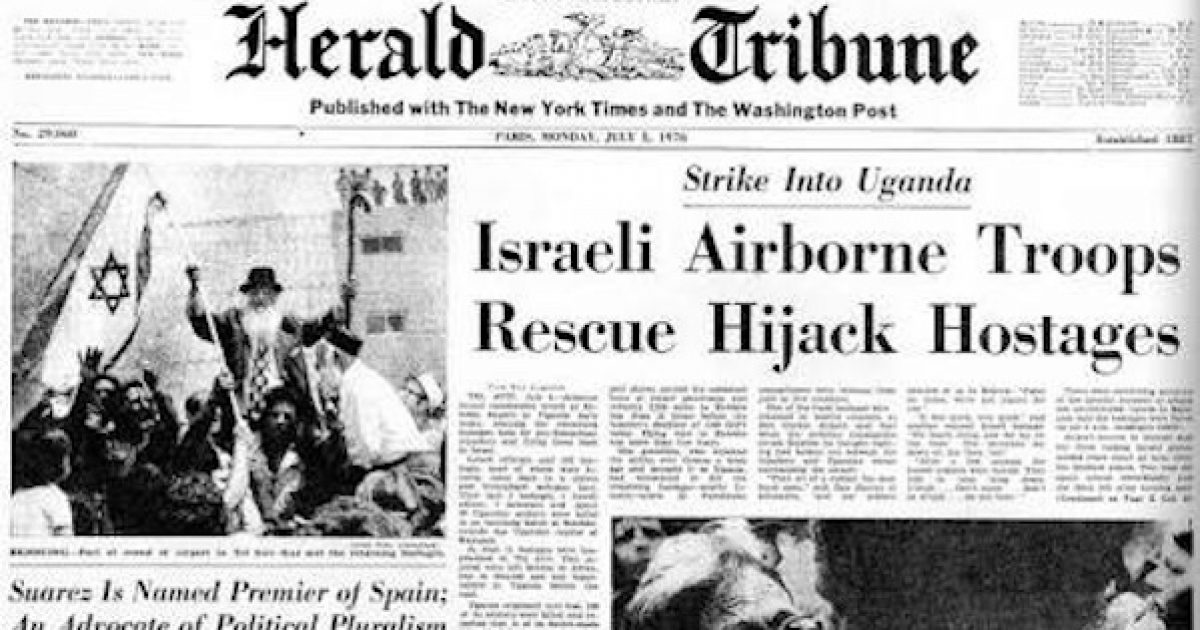
This is how it happened.
On June 27, 1976, Air France Flight 139, carrying 248 passengers and a crew of twelve, took off from Athens, heading for Paris. Soon after the 12:30 p.m. takeoff, the flight was hijacked by two Palestinians from the Popular Front for the Liberation of Palestine and members of the German “Revolutionary Cells (RZ),” whose names were Wilfried Böse and Brigitte Kuhlmann.
After the terrorists commandeered the flight, diverting it to Benghazi, Libya, for refueling. The plane left Benghazi, and at 3:15, it arrived at Entebbe Airport in Uganda. There they were welcomed by the Ugandan despot, President Idi Amin Dada, and Ugandan soldiers who were ordered by Amin to secure the airport.
At Entebbe, the four hijackers were joined by three “friends.” The hijackers were led by the German, Böse. They demanded the release of 40 Palestinian terrorists held in Israel and 13 other detainees imprisoned in Kenya, France, Switzerland, and Germany–and if these demands were not met, they threatened to begin killing hostages on July 1, 1976. Eventually, that deadline was extended to July 4.
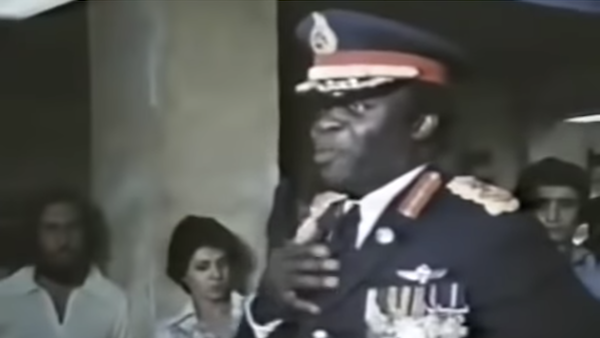
Idi Amin ‘Visits’ Hostages At Entebbe Airport
The hijackers held the passengers hostage in an abandoned transit hall of Entebbe Airport. They separated Israelis and several non-Israeli Jewish people from the rest of the passengers and forced them into a separate room.
The terrorists then threatened to kill all the hostages if Israel did not comply with their demands.
They really didn’t mean ALL the passengers. Over the following two days, 148 hostages that weren’t in the Israeli/Jewish group or the flight crew were released and flown by Air France to Paris.
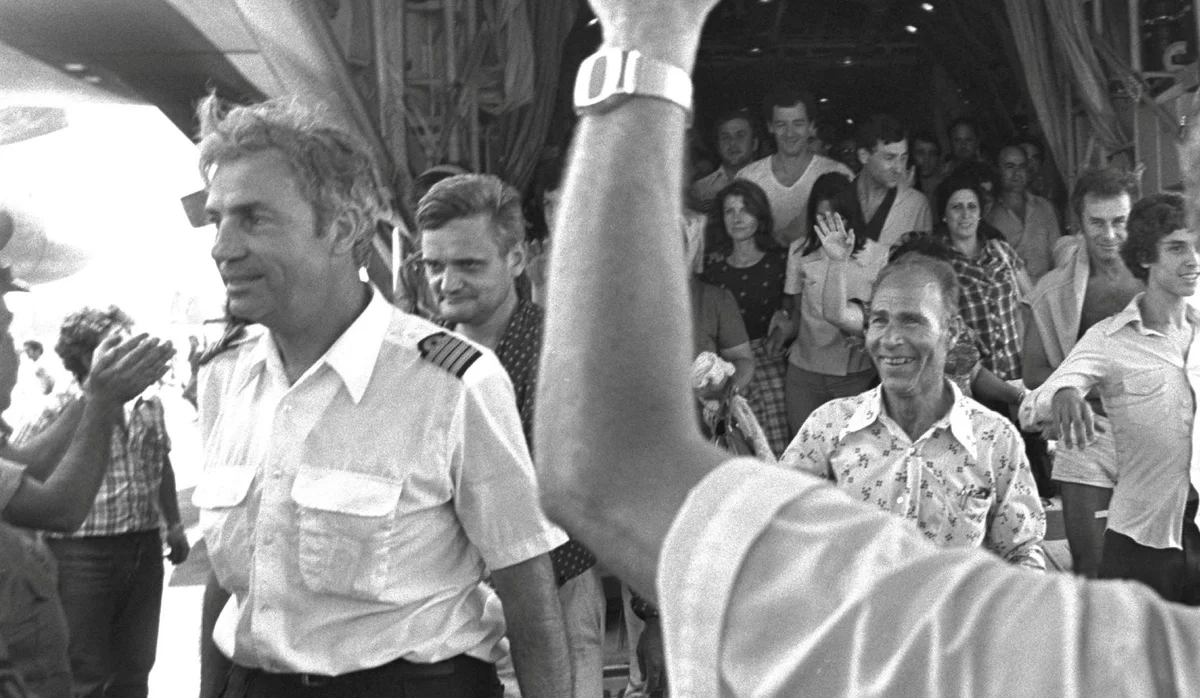
Captain Michel Bacos
The captain of the hijacked plane, Michel Bacos, told the terrorists that all passengers, including the remaining ones, were his responsibility. He would not leave them behind. Bacos’ entire crew followed suit.
“When I was being held hostage and had the possibility of being released, I called the crew together and said: ‘We have to remain with the passengers until the end — that is our duty’. It was an immediate, unhesitating decision. Every member of my crew agreed with me. We would stay with the hostages no matter what and return with them to France. To me it was not just a question of the law — it was to do with basic values of decency and human behavior. It was, simply put, the right thing to do.”
A French nun also refused to leave, insisting that one of the remaining hostages take her place, but Ugandan soldiers forced her onto a plane, taking the freed hostages to Paris. A total of 85 Israeli and/or Jewish hostages remained, as well as 20 others, most of whom included the crew of the Air France plane.
When they arrived in Paris. Israeli agents were there to meet with the freed hostages to collect descriptions of the areas where the hostages were kept and the hijackers’ dress and behavior.
For nearly a week, pro-Palestinian skyjackers had held 105 hostages—mostly Israeli—at Uganda’s Entebbe Airport. With time rapidly slipping away and the deadline merely hours off, death seemed inevitable for the terrified captives.
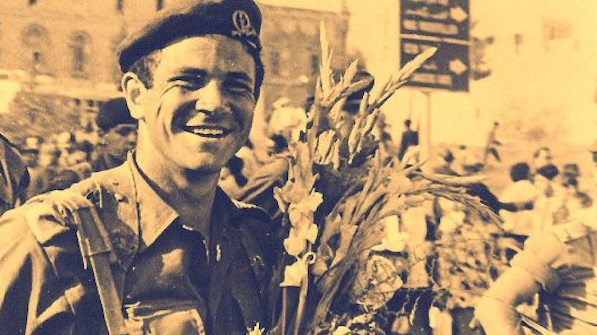
Yoni Netanyahu
On July 3, 1976, four Lockheed C-130 Hercules holding more than 200 soldiers took off from Sharm el-Sheikh airport in Israel on their way to Entebbe airport in Uganda, a distance of approximately 2,500 miles.
The planes flew in international waters over the Gulf of Suez into the Red Sea. But because that route took them close to Egypt and Saudi Arabia, they flew extremely low to avoid radar during the eight-hour flight.
To keep the Entebbe mission on schedule, the planes took off before the government had approved the rescue mission. They flew in radio silence. The only exception would be if the government declined the mission and they were recalled back home.
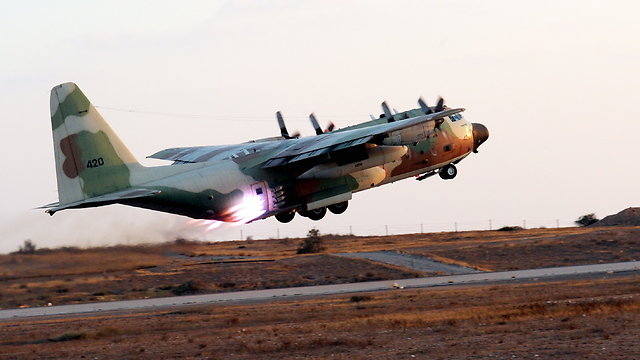
Lockheed C-130 Hercules
Early in the morning of July 4 came one of the most daring, spectacular rescues of modern times.
Suddenly Israeli C-130 Hercules transports, guns flaring, appeared in the dark sky over the airport. Shortly after midnight on July 4, 1976, the Israeli planes landed at Entebbe and began their now-famous rescue.
The decision to send Israeli troops into Uganda was agonizing for the former general Prime Minister Yitzhak Rabin. Rabin knew that suggesting military plans for a miracle rescue and authorizing them to proceed were two entirely different matters.
Defense Minister Shimon Peres claimed he had to fight for the mission with PM Rabin, who objected to the rescue operation.
However, Israeli Major General Amiram Levin, who gathered intelligence for the operation and attended the cabinet meeting ahead of the Entebbe rescue, had a final plan said Rabin was lying:
He was especially a liar and a crook,” Levin said, accusing Peres of using a “large industry” of people dedicated to casting the late statesman in a positive light by building up his achievements.
Levin continued: “As defense minister, he did nothing, but really nothing. The credit at the decision-making level should go to Rabin or Benny Peled, [then-]Air Force commander, and to everyone on the ground, including Yoni. Peres didn’t do anything, he just understood what was at stake and convened a [cabinet] meeting.”
Once the planes landed in Entebbe, the assault lasted less than 30 minutes, and all six hijackers were killed.
Team leader Yonatan Netanyahu (older brother of former PM Binyamin Netanyahu) was the only Israeli commando killed during the operation. The elder Netanyahu was shot in the back near the airport entrance, apparently by a Ugandan sniper who fired at the Israeli commandos from the nearby control tower.
Five additional soldiers were wounded (one of the five was paralyzed), three Israeli hostages were killed during the initial exchange of fire, and approximately 10 were wounded.
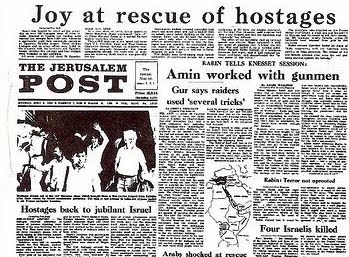
One more passenger died. Seventy-five-year-old Dora Bloch became ill on the plane and was transferred to Mulago Hospital in Uganda after the Air France flight. She was not rescued during the Entebbe raid with the other hostages because she was still in the Hospital.
A confidential Foreign Office memo written by James Hennessy, the British High Commissioner to Uganda, found 31 years after the raid, said:
“She had been seen by a consultant at Mulago Hospital last Sunday long after the Israeli commandos had come and gone. Since then she had been not seen anywhere. Our information was that she had been dragged from her bed at the hospital screaming. Though she had been living in Israel, she was a British national and our responsibility. “
It also confirmed she was killed on the order of Idi Amin. Her disappearance led to Britain cutting diplomatic ties with Uganda
The rescued hostages were flown out to Israel via Nairobi shortly after the fighting.

Welcome Home
“This operation will certainly be inscribed in the annals of military history, in legend, and in national tradition,” Prime Minister Yitzhak Rabin said in the Knesset later that day.
The government of Uganda later convened a session of the United Nations Security Council to seek official condemnation of the Israeli raid as a violation of Ugandan sovereignty. The Security Council ultimately declined to pass any resolution on the matter, which was almost as big a miracle as the raid’s success.
In his address to the Security Council, the Israeli ambassador to the United Nations, Chaim Herzog, said:
“We come with a simple message to the Council: we are proud of what we have done because we have demonstrated to the world that a small country, in Israel’s circumstances, with which the members of this Council are by now all too familiar, the dignity of man, human life and human freedom constitute the highest values. We are proud not only because we have saved the lives of over a hundred innocent people—men, women, and children—but because of the significance of our act for the cause of human freedom.”
Those were words the world quickly forgot.
For refusing to depart and leave some of his passengers alone when given leave to do so by the hijackers, Captain Bacos was reprimanded by his superiors at Air France (gotta love the French) and suspended from duty for a period.
Chaim Herzog’s words still ring true.
That act of rescuing 100+ hostages still rings true.
The act of fighting for freedom still rings true.
The lesson of Entebbe was the same as Americans had learned 200 years before on July 4, 1776– freedom is important enough to fight for.
On the 25th anniversary of the raid, the late Israeli Prime Minister Arial Sharon spoke:
“In these confusing times, when there are those who question our capabilities or the justness of our cause, we return to those few hours when Israel stood up and in the face of the entire community of nations, waged a battle against violence and terrorism, proving that we can win. These days, when we are in the midst of an ongoing battle against terrorism, violence, and incitement, and when we are making a joint national effort to return to political negotiations without fire, we must rekindle the spirit of that operation. The secret of our strength lies in such spirit and faith, and if we learn how to renew it we will be able to meet all the challenges that still lie ahead”
In 1976 Israel stood up to terrorists and gave Israel the morale boost it needed, and on the 200th anniversary of the birth of the United States, reminded the country of the spirit of 1776. In fact, the daring raid was celebrated across the world.
But Entebbe may have been one of the final acts of Western defiance. Every act of appeasement, each acquiescence to terrorist demands, or deal with state supporters of terrorism, is the equivalent of the terrorist murderers suckling at the teat of the Western World’s lack of resolve. The West may be feeding the monster that will cause its destruction.
Tags: Commentary




















Join the conversation!
We have no tolerance for comments containing violence, racism, vulgarity, profanity, all caps, or discourteous behavior. Thank you for partnering with us to maintain a courteous and useful public environment where we can engage in reasonable discourse.